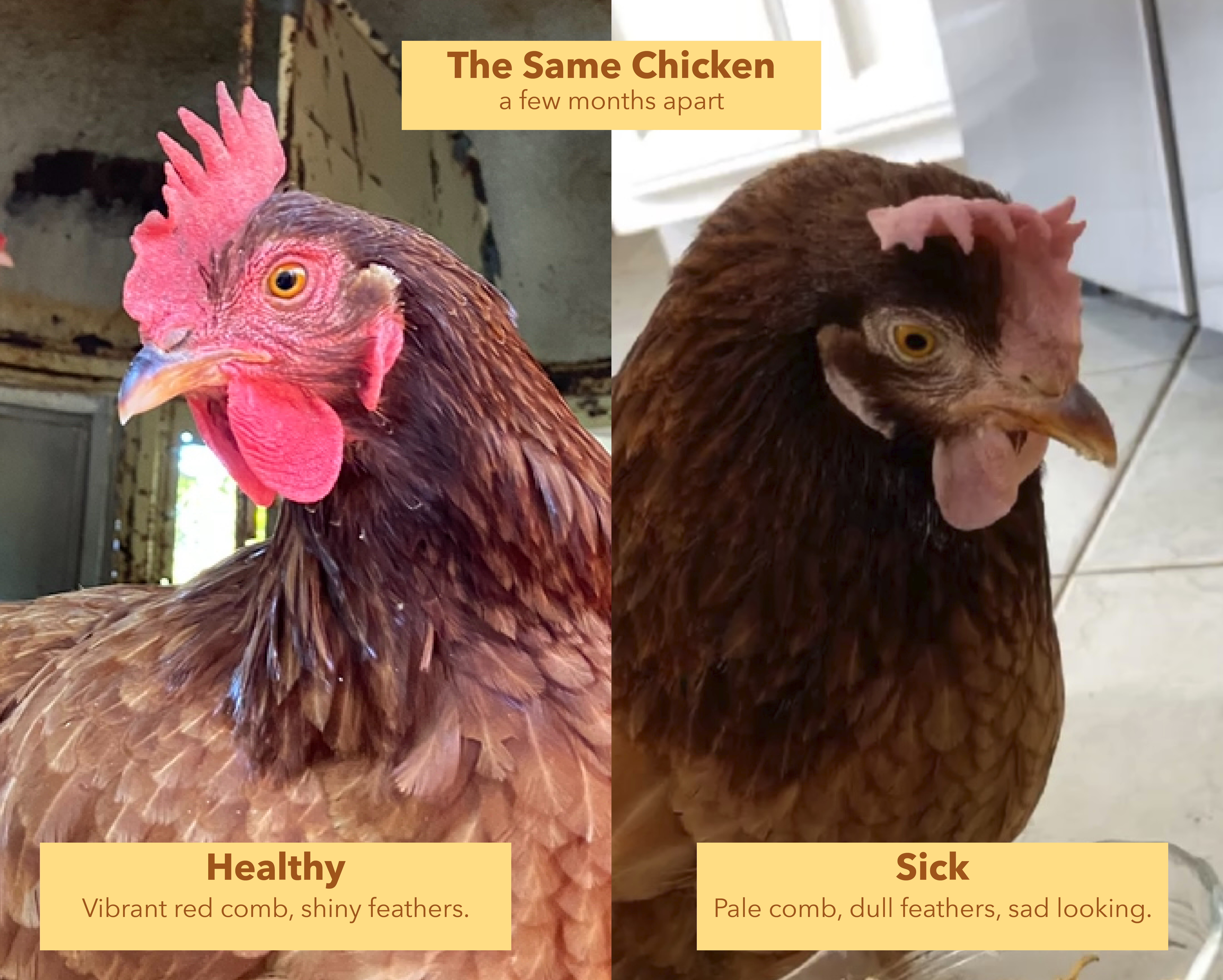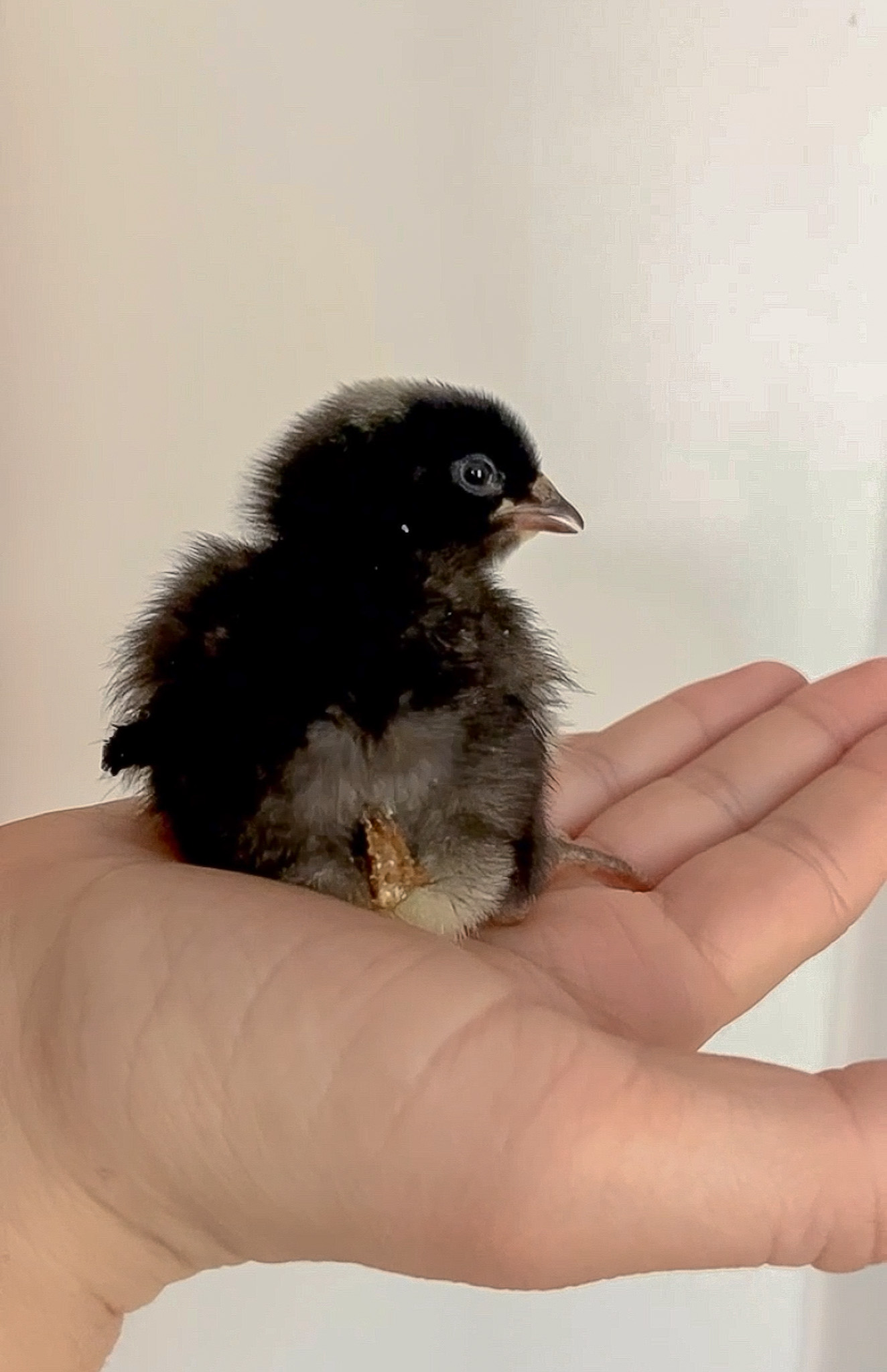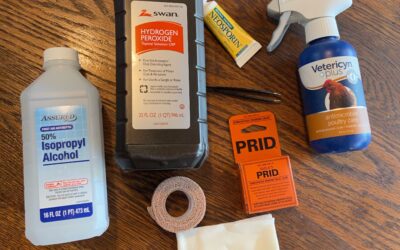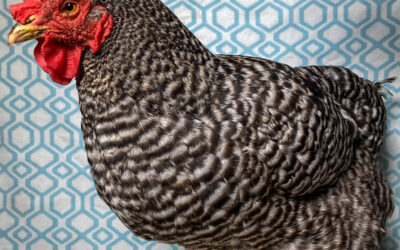
Chicken Health
Learn about common ailments in chickens, how to tell when your flock may be sick, what to do if you notice signs of illness and how to keep your chickens healthy in the first place!
Disclaimer: this page is meant to be used as an introduction to chicken health. It is not written by a veterinarian. We share long-standing backyard chicken keeper remedies, but we recommend you always consult a medical professional before treating a sick bird.
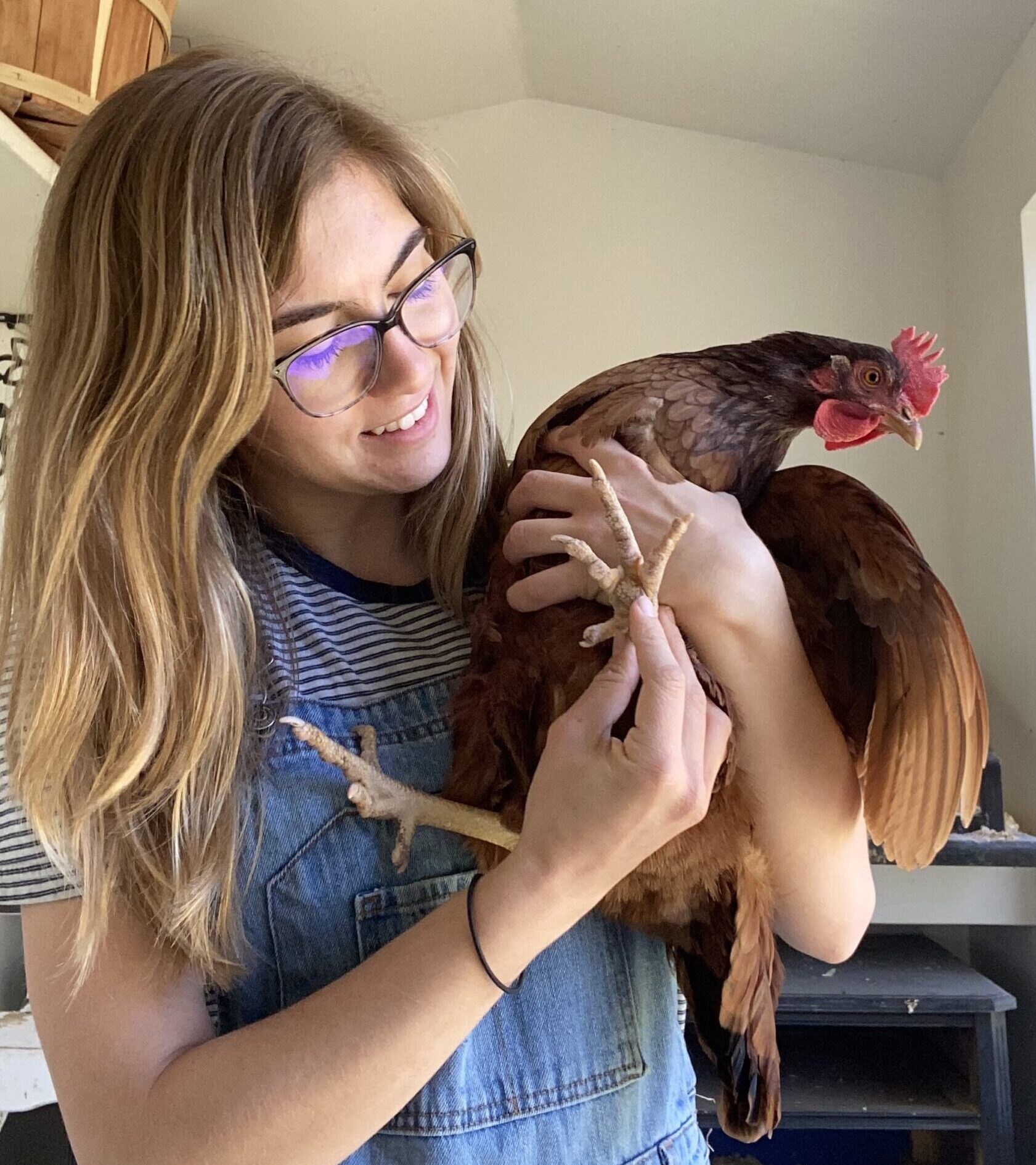
Common Chicken Health Problems
Some common health issues in chickens include:
- Respiratory issues: chickens can have seasonal allergies like humans, or contract infections from damp and dirty conditions.
- Foot issues: Bumblefoot and scaly leg mites are common. Bumblefoot is a staph (staphylococcus bacterial) infection in the foot of a chicken that can be itentified by a black/brown “corn” or round spot on the foot pad. Scaly leg mites are microscopic mites that burrow between the scales on chicken legs and feet.
- Reproductive tract issues: a weird egg now and then is normal, but if you are noticing lots of unusual eggs there may be an issue. Hens can become “eggbound” when an egg is stuck in their reproductiven tract.
- Worms and parasites: internal worms and parasites may have infected your chickens if you notice lots of runny poop with white strings, or poop sticking to the feathers around the hen’s vent. Chickens can also contract poultry lice from wild birds. Although not trtansferrable to humans, left untreated, poultry lice can make a bird very sick. You may notice little cream colored bugs crawling around the chicken’s eye or vent, and white eggs clustered on feather shafts near those places as well.
This is by no means an exhaustive list of common ailments, however it gives you a good idea of some things you may need to handle as a chicken owner.
Common Signs of Illness in Chickens
Chickens are prey animals, which means they are good at hiding their weaknesses. So, by the time you notice an issue, it is usually worse than you think and should be treated promptly.
Some signs of a sick chicken include:
- Down tail
- Pale comb
- Lameness
- Strange looking poop
- Misshapen eggs
- Bizarre behaviors
- Issues around vents (redness, protrusion, purple spots, bugs, etc.)
- Leg/foot issues (upturned scales, abnormal redness, lesions, brown spots)
- Abnormally full crops or balloon-like crops
- Unusual breathing patterns (wheezing, whistling, shallow breathing, etc.)
- Feather loss (which is normal in fall when chickens molt)
The best way to tell if your flock is unhealthy is simply by spending a bit of time with them! Get to know their personalities before they are sick, in order to recognize when something is off.
Creating a proper coop setup before getting chickens is crucial to preventing illness in your flock.
Preventing Poor Chicken Health
The best way to keep your chickens healthy is prevention. The three main ways to do this are to keep their coop and run clean, feed your chickens a proper diet, and implement biosecurity measures to get ahead of any illness your flock may encounter.
Environment
Keep your chicken coop clean, dry, and secfure from pests and predators to prevent most ailments.
Water
Ensure clean water is always available to your flock. Drinkers should be cleaned with warm water and soap ever day-every other day to prevent algae and other contaminants from making your flock sick.
Food
Chickens should be fed a high-quality, formulated feed, that is clean, dry, and free from mold.
- Consult with your local feed store about what types of feed to give your chickens.
- You can try fermenting chicken feed or wetting it a little bit at feeding time to entice your chickens to eat and unlock extra benefits.
- Food should be changed daily and made available in a clean feeder. Leaving food out overnight attracts pests that can introduce disease.
- Only feed foods, supplements, and treats that are healthy for chickens. Remember, treats should only be about 10% of a chicken’s diet!
- Electrolytes can be given to your flock in times of stress to help build their immune system.
Your flock’s dietary needs will change depending on the time of year and their life stage. Visit our Nutrition Page for more information.
How to Perform a Health Check on a Chicken
Paying attention to your flock’s behaviors can help you keep them healthy. Health checks should be performed frequently to ensure your flock is staying ailment free!
Daily
Do a quick visual check. When you let the flock out or feed them, look for any obvious signs of sickness–pale combs, down tails, lameness, weird poops, strange behaviors, or weird looking eggs. Also check combs for spots where your chicken may have been pecked (from builllying). This is all easy visual stuff that can be done every day.
Weekly-Monthly
Between longet time intervals, you will want to pysically inspect each chicken. Check their vents for signs of bugs, redness, and other abnormalities. Inspect at their legs and feet or upturned scales, redness, or bumblefoot corns. Feel your flock’s crops to see if they feel hard like a baseball or soft like a balloon (but remember, crops should be full at night and empty in the morning). Listen to their breathing for any wheezing or shallow breaths. Check around your flock’s necks for lice/eggs. Although more time consuming that a visual daily check, physically examining your flock every so often can help you catch major illnesses and keep them from spreading.
A special note about chicks:
Chicks must have more frequent inspections than adult hens, especially the first few weeks. Things you will want to watch for include:
-
-
- Extra extremities
- This only counts right after hatch, but we know people who have purchased chicks with extra toes and even an extra butt! Obviously, the extra butt chick did not make it.
- Curled toes
- Splay leg
- Pasty butt (pictured)
- Energy level
- Chicks sleep a lot, but if you see a chick with heavily strained breathing, off on its own, sleeping a lot, it may be a sign of a more serious issue.
- Healthy appetites
- Abnormal or hastened breathing patterns
- Lack of chirping
- Extra extremities
-
What To Do If You Notice Signs Your Chicken Is Sick
Typically, you want chickens to be in a safe, dry, dark, warm place to recover from any illness. Hens should especially be put in a dark place to try and disrupt her egg cycle, as laying an egg may put more stress on her body.
Our next step is to give the sick or injured chicken a warm epsom salt bath. This seems to cure many common ailments, and relaxes the chicken. Simply draw a warm bath or heat up lukewarm water and put it in a container large enough for a chicken to stand in. We usually dissolve 1/4 cup of epsom salt to 3 gallons of water (approximately). Let the chicken sit in the bath for 15-30 minutes and dry them with a towel.
From there, you can Google sypmtoms and treatment. We suggest using the credible resources below to learn more about treating your chicken’s health problems.
The Chicken Health Handbook by Gail Damerow
Click here to purchase on Amazon using our Affiliate link.
The Chicken Chick Blog
Facebook groups
Backyard Chickens Blog
Read More From Our Blog
Chicken First Aid Kit- Why You Should Have One and What to Include
To give your chickens their best chance at survival when something goes wrong, it is a good idea to be prepared by having a fully stocked Poultry First Aid Kit.
Below you will find an alphabetical list* of things we incorporate in our first aid kits.
Spices and Herbs That Are Good for Chickens
If you raise backyard chickens, chances are you love to spoil them. We have such a fun time feeding our flock grapes and other treats, but did you know your “spoiling” of your flock can be beneficial to their health?
Adding small amounts of these herbs is a great way to boost your chickens’ overall health!
How to care for Bumblefoot in chickens.
Bumblefoot (ulcerative pododermatitis) is a Staphylococcus aureus (S. aureus) bacterial infection in poultry and other birds caused by damage to tissue on their feet.
We are not medical professionals, however our staff does have lots of experience treating sick chickens. If you have a chicken health-related question, feel free to message us on Instagram and we can try to point you towards answers!

